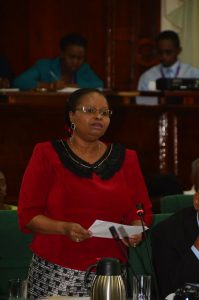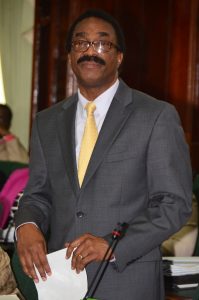THE National Assembly yesterday passed the Constitution (Amendment) Bill which amends Article 222A of the constitution, challenging a popular belief that a two-thirds majority was required for constitutional amendments in the National Assembly. The Bill, presented by Attorney-General and Legal Affairs Minister, Mr Basil Williams, first debuted in 2013 when then Opposition, A Partnership for National Unity Parliamentarian, Mr Carl Greenidge, now Vice-President and Foreign Affairs Minister, brought it to the House.
It seeks to provide financial autonomy to a number of constitutional bodies, including the Chambers of the Director of Public Prosecutions, Judicial, Police, and Teacher Service Commissions, Public Service Appellate Tribunal, Office of the Ombudsman, and the Guyana Elections Commission.
“A literal interpretation of the provisions [Article 222A] conveys that the seven entities listed in the third schedule are independent entities. Article 222A, however, seeks to assure or guarantee their independence by providing a mechanism in paragraph 222A 1(a).
“This legislation raises a question of good governance, and it seeks to restore due constitutionality at the independence of certain constitutional commissions and bodies,” Attorney-General Williams noted in his address to the National Assembly yesterday.
“The expenditure of each of the entities shall be financed as a direct charge on the Consolidated Fund determined as a lump-sum by way of an annual subvention approved by the National Assembly,” AG Williams said, adding:
“Article 226 (1) provides that in exercise of its function under this constitution, a Commission shall not be subject to the direction or control of any other person or authority.”
Making a case that the amendment does not require a two-thirds majority, which would include the opposition People’s Progressive Party/Civic (PPP/C), Williams argued that clauses and the process for amending are included in the provisions.
Article 164 (1) of the Constitution, according to Williams, provides for a vote by simple majority, while Article 164 (2) (a) provides for a referendum, and Article 164 (2) (b) provides for a two-thirds majority.
“If Article 222A is not listed under the referendum provisions, nor is it listed under the two-thirds majority provisions, it could only be by virtue of not being listed therein that it is required to be under Article 164 (1), which provides for a simple majority,” Williams continued.
Meanwhile, former Attorney-General, Mr Anil Nandlall has turned to the media to explain what he called the “unconstitutional” passage of the Bill. “This Bill seeks to amend the Third Schedule of Article 222A of the Constitution by adding certain entities to the said schedule,” Nandlall noted in his letter published in the Guyana Chronicle, while noting the “many implications which [will] arise from this.”
“It is more commonsense and logic than law, that the schedule to an article in the constitution is part of that article. Therefore, the Third Schedule is part of Article 222A.” If Nandlall is correct then the provision, which was amended by the APNU+AFC Government in the National Assembly must require a two-thirds majority.
“This Bill seeks to rescue the institutions concerned with the protection of our fundamental rights from the clutches of the Executive, the Vice-President and Foreign Affairs Minister told the National Assembly yesterday in support of the bill, which he first brought to the House in 2013.
When that bill was brought to the National Assembly and approved, according to Greenidge, “the [then] Attorney General [Anil Nandlall] and the Government advised the [former] President [Donald Ramotar] not to sign the bill on grounds that it was illegal.”
“The APNU+AFC coalition, notwithstanding the fact that it is now in Government, has no difficulty putting in place a bill which in effect would curb the excesses of the Executive,” Greenidge continued.
Greenidge went on to challenge the Fiscal Management and Accountability Act which, according to him, impedes on the independence of constitutional bodies since the heads of budget agencies were expected to justice their financial request to the Finance Secretary.
Meanwhile, Social Protection Minister Volda Lawrence also lent her voice in support of the Bill as she spoke to the independence of constitutional commissions and agencies being critical for the promotion of democracy.
She noted that democratic constitutions are based on the philosophy of the decentralisation of power, and the Bill grants constitutional bodies the power to administer and control monies allocated to them in the execution of their duties, while lessening the reach of the executive arm of the Government.
The Bill was passed yesterday in the National Assembly and will be put before President David Granger for his assent.
By Derwayne Wills


